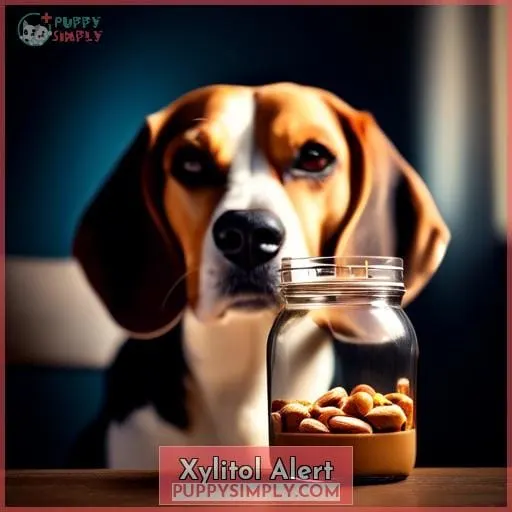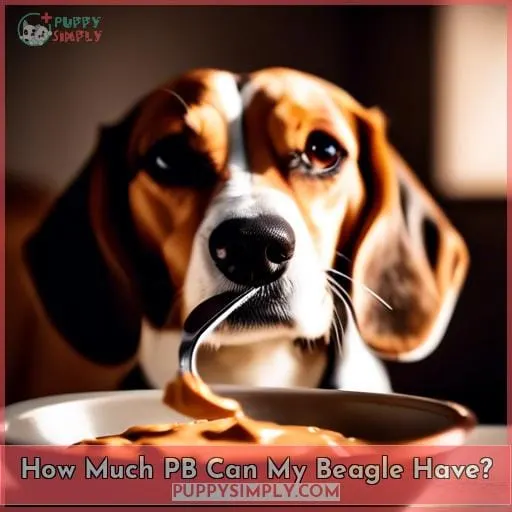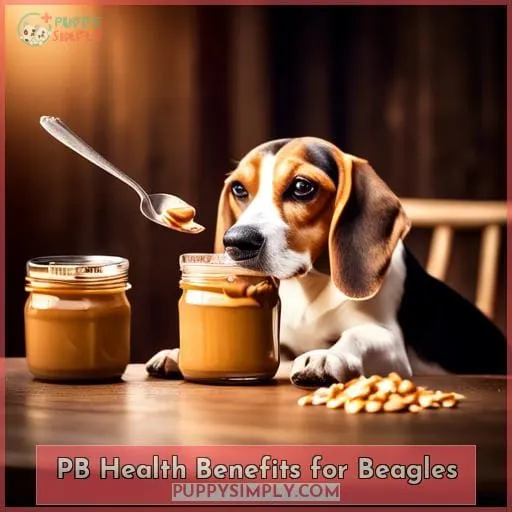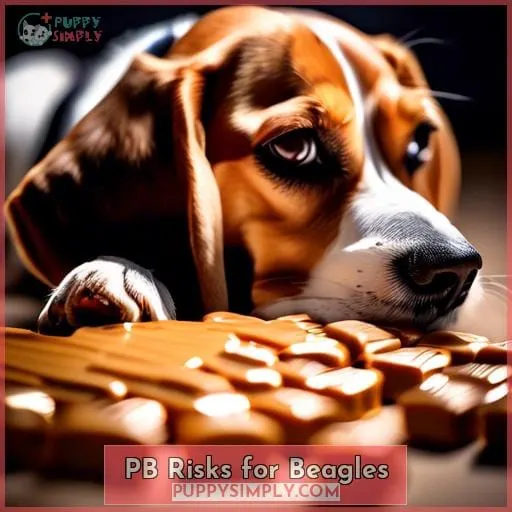This site is supported by our readers. We may earn a commission, at no cost to you, if you purchase through links.

Yes, dogs can eat peanut butter as long as it is fed in moderation and does not contain xylitol.
But be careful, not all peanut butters are created equal.
Some contain xylitol, an artificial sweeter that is toxic to dogs.
So, before you share your PB&J with your furry friend, read on to learn how to choose the right peanut butter and how much to give your Beagle.
Table Of Contents
- Key Takeaways
- Can Beagles Eat Peanut Butter?
- Xylitol Alert
- How Much PB Can My Beagle Have?
- How to Feed Peanut Butter to Your Beagle
- PB Health Benefits for Beagles
- PB Risks for Beagles
- What to Do if Your Beagle Eats Too Much PB
- Frequently Asked Questions (FAQs)
- Can beagles have peanut butter as a treat or only as a training reward?
- What are some alternative nut butters that are safe for beagles?
- Are there any specific brands of peanut butter that are recommended for beagles?
- How can I make sure that my beagle doesn’t develop an allergy to peanut butter?
- What should I do if my beagle shows signs of a peanut butter allergy?
- Conclusion
Key Takeaways
- Beagles can eat peanut butter in moderation as an occasional treat, but it should not exceed 10% of their daily calorie intake.
- Peanut butter provides essential nutrients like protein, healthy fats, vitamins B and E, calcium, magnesium, and potassium, which support a beagle’s overall well-being.
- Potential risks of peanut butter for beagles include allergies, choking hazards from chunky peanut butter, illness from spoiled peanut butter, weight gain and dental problems from excessive sugar, and pancreatitis from high-fat content.
- To ensure safe peanut butter consumption, choose pure peanut butter without additives, avoid peanut butter with xylitol, introduce peanut butter slowly, and store it out of the beagle’s reach.
Can Beagles Eat Peanut Butter?
Safety’s what matters most when giving your Beagle peanut butter. While it’s a tasty treat, there are a few things to keep in mind.
First, ensure it’s pure peanut butter without added sugars, salts, or oils. These additives can upset your Beagle’s stomach or even be toxic.
Second, watch out for xylitol, a common sweetener that’s toxic to dogs. Even small amounts can cause serious health problems, so always check the label before giving your Beagle peanut butter.
With those precautions in mind, peanut butter can be a healthy and enjoyable treat for your furry friend.
If you’re feeling adventurous, you can even try making your own peanut butter at home. It’s easy to do and a great way to control the ingredients. Just blend roasted peanuts in a food processor until smooth, and you’re done!
Additional Tips:
- Introduce peanut butter slowly to avoid stomach upset.
- Feed peanut butter in moderation as it’s high in calories and fat.
- Store peanut butter out of reach of your Beagle to prevent them from overindulging.
Xylitol Alert
Watch out for xylitol, a common sugar substitute toxic to dogs.
Just a tiny amount can cause xylitol toxicity, leading to a rapid drop in blood sugar and liver failure.
The symptoms, like vomiting, lethargy, and seizures, can start within 10 to 60 minutes.
If you suspect your beagle has eaten xylitol, rush them to the vet immediately.
When choosing peanut butter for your furry friend, always check the label for xylitol.
Opt for brands that use dog-safe sweeteners like honey or molasses.
How Much PB Can My Beagle Have?
Following a xylitol-free confirmation, you can incorporate peanut butter into your beagle’s diet, but in moderation.
A good rule of thumb is to limit peanut butter treats to no more than 10% of your beagle’s daily calorie intake.
This means that if your beagle eats 1,000 calories per day, they should consume no more than 100 calories from peanut butter.
You can give your beagle peanut butter in various ways:
Spread it on toys: This is a great way to keep your beagle entertained while they’re getting a tasty treat.
Just be sure to supervise them while they’re chewing on the toy to prevent them from swallowing large pieces of peanut butter.
Mix it into their food: Adding a dollop of peanut butter to your beagle’s regular food can make it more enticing and encourage them to eat.
Use it as a training treat: Peanut butter is a great high-value treat that can be used to reward your beagle for good behavior.
Just be sure to use it sparingly so that it doesn’t become an everyday occurrence.
How to Feed Peanut Butter to Your Beagle
When offering peanut butter to your beagle, dilute it with water or spread it on toys to prevent gulping. This slows down consumption, allowing your furry friend to savor the flavor and avoid digestive distress.
Homemade Goodness:
Craft your own peanut butter using fresh, unsalted peanuts. This ensures a treat free from harmful additives and preservatives.
Peanut Butter Toys:
Engage your beagle’s playful side with peanut butter-st■ toys. This mental and physical stimulation keeps boredom at bay.
Training Aid:
Transform peanut butter into a training tool. Smear a dollop on a spoon and use it as a reward during training sessions. This positive reinforcement technique strengthens the bond between you and your beagle.
Peanut Butter Allergies:
Monitor your beagle for signs of an allergic reaction, such as skin irritation, vomiting, or diarrhea. If you suspect an allergy, consult your veterinarian immediately.
PB Health Benefits for Beagles
As a dog owner, you want to give your Beagle the best, and that includes healthy treats.
Peanut butter, when given in moderation, can be a tasty and nutritious snack for your furry friend.
It provides protein and healthy fats, along with vitamins and minerals that support your Beagle’s overall well-being.
Protein and Fat Source
With its rich protein and fat content, peanut butter serves as a nourishing snack for your active Beagle.
The protein helps maintain strong muscles, while the fats provide energy and aid in nutrient absorption.
However, moderation is key. Too much peanut butter can pack on the pounds, so offer it sparingly as a treat or training reward.
Vitamins and Minerals
Enrich your beagle’s health with peanut butter’s treasure trove of vitamins and essential minerals.
Its rich vitamin B and E content supports a healthy coat and bright eyes, while niacin keeps their energy levels high.
Calcium and magnesium strengthen bones and teeth, while potassium regulates blood pressure.
Forget expensive enriched kibble, mineral supplements, or vitamin deficiency worries.
Just a dollop of peanut butter can do wonders for your beagle’s well-being.
Moderate Consumption
Moderate peanut butter consumption provides your Beagle with essential nutrients, but too much can lead to weight gain and health issues.
Stick to the 10% rule: treats should make up no more than 10% of your Beagle’s daily diet.
If you’re concerned about xylitol, opt for homemade peanut butter or xylitol-free brands.
PB Risks for Beagles
A few risks come with feeding your beagle peanut butter:
- Some dogs may be allergic to peanuts, so watch for signs like hives, swelling, and difficulty breathing.
- Since beagles love to chew and swallow quickly, chunky peanut butter can pose a choking hazard.
- Spoiled peanut butter harbors bacteria and mold, which can make your pup sick.
- Excessive sugar in peanut butter can lead to weight gain and dental problems.
- Finally, pancreatitis, an inflammation of the pancreas, can occur if your beagle eats too much peanut butter due to its high-fat content.
If you suspect any adverse reactions, seek veterinary attention promptly.
What to Do if Your Beagle Eats Too Much PB
Now that you’re aware of the potential risks, let’s tackle what to do if your Beagle buddy indulges in an excessive amount of peanut butter.
First off, don’t panic. Monitor your Beagle’s behavior and watch for signs of discomfort like vomiting, diarrhea, or a sudden change in appetite.
Secondly, focus on dog weight management. Cut back on other treats and increase their daily exercise to prevent weight gain. Pancreatitis prevention is key, so avoid feeding your Beagle fatty foods and opt for a low-fat diet.
Finally, consider making your own homemade dog treats with unsalted peanut butter brands. This way, you can control the ingredients and ensure there’s no added sugar or salt. You can also explore alternative dog treats like fruits, veggies, or specially formulated dog chews.
Frequently Asked Questions (FAQs)
Can beagles have peanut butter as a treat or only as a training reward?
Sure, beagles can enjoy peanut butter.
As a delightful treat or as a rewarding incentive during training sessions.
What are some alternative nut butters that are safe for beagles?
Beyond peanut butter, beagles can blissfully bite into bits of cashew, almond, or sunflower seed butter.
Be mindful of moderation, monitor munching, and make mealtime merry!
Are there any specific brands of peanut butter that are recommended for beagles?
When selecting peanut butter for your beagle, opt for brands that are:
- All-natural
- Unsweetened
- Free of xylitol, a toxic sweetener
These brands prioritize your pet’s well-being.
How can I make sure that my beagle doesn’t develop an allergy to peanut butter?
Introducing peanut butter to your beagle should be done gradually.
Start with a small amount and watch for any signs of an allergic reaction, such as itching, swelling, or vomiting.
If your beagle shows no adverse effects, you can slowly increase the amount given.
What should I do if my beagle shows signs of a peanut butter allergy?
If your beagle shows signs of a peanut butter allergy, such as hives, swelling, or difficulty breathing, take immediate action.
Rush them to the vet for prompt medical attention.
Follow their expert guidance to ensure your furry friend’s well-being.
Conclusion
Did you know that peanut butter is the second most popular dog treat in America?
It’s no wonder why Beagles love it so much!
Just remember to choose a peanut butter that doesn’t contain xylitol, and to feed it to your Beagle in moderation.
A little bit of peanut butter can be a delicious and healthy treat for your furry friend.












